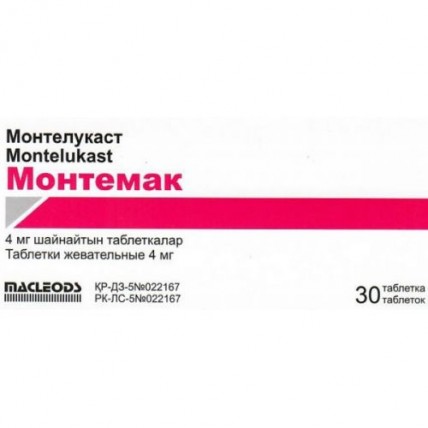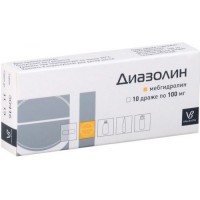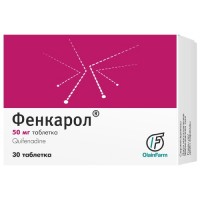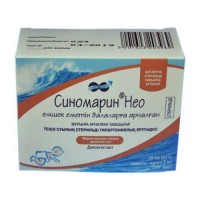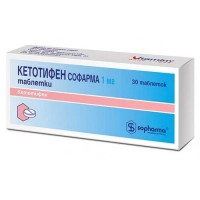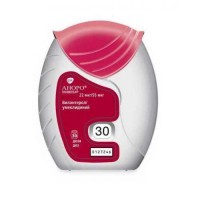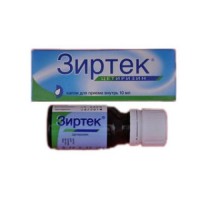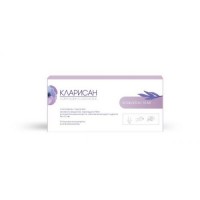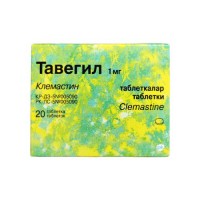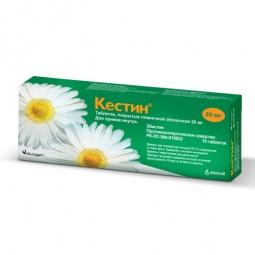Montemak 30s 4 mg chewing tablets
- $23.80
The instruction for medical use of MOHTEMAK medicine the Trade name Montemak Mezhdunarodnoye the unlicensed name Montelukast Dosage Form chewable tablets, 4 mg and 5 mg Structure One tablet contains active agent – sodium montelukast of 4.16 mg or 5.20 mg (it is equivalent to montelukast of 4 mg or 5 mg), excipients: Mannitolum, cellulose microcrystalline (Avicel PH 101), sodium of a kroskarmelloz, iron (III) oxide red (E172), hydroxypropyl cellulose, sodium edetat, magnesium stearate, aspartame, fragrance with taste of cherry (FL SD 594). The description of the Tablet motley chewing an oval form, pink color, biconvex, with an engraving of CL55 on one party and equal on the other hand (for a dosage of 4 mg). Tablets motley chewing round shape, pink color, biconvex, with an engraving of CL56 on one party and equal on the other hand (for a dosage of 5 mg). Pharmacotherapeutic group Drugs for treatment of obstructive respiratory diseases. Other drugs drugs for treatment of obstructive respiratory diseases for system use. Leukotriene receptors antagonists. Montelukast. The ATX R03DC03 code the Pharmacological Pharmacokinetics Absorption Montelukast properties is quickly absorbed after oral administration. For tablets, film coated, on 10 mg, average maximum concentration (Cmax) in blood plasma was reached in 3 hours (Tmax) after drug use by adults on an empty stomach. The average bioavailability at oral administration is 64%. Intake of usual food did not affect bioavailability at oral administration and on Cmax. For chewable tablets, on 5 mg, Cmax was reached in 2 hours after reception on an empty stomach at adults. The average bioavailability at oral administration was 73% and decreased to 63% at reception with standard food. Cmax was reached in 2 hours at children aged from 2 up to 5 years posln intake of chewable tablet on 4 mg on an empty stomach. Average Cmax was 66% higher while average Cmin was lower, than adults after reception have tablets on 10 mg. Distribution Montelukast more than for 99% contacts proteins of blood plasma. The volume of distribution of montelukast in an equilibrium state averages 8-11 liters. Metabolism Montelukast is actively metabolized. Metabolism of montelukast happens, mainly, by means of the system of P450 2C8 cytochrome. CYP 3A4 and 2C9 have small impact. Therapeutic concentration of montelukast in blood plasma do not inhibit P450 3A4, 2C9, 1A2, 2A6, 2C19 or 2D6 cytochromes. The role of metabolites in therapeutic effect of montelukast is minimum. Removal Plasma clearance of montelukast makes, on average, 45 ml/minute. Montelukast and its metabolites are removed, almost completely, with bile. The average half-life period of montelukast varies from 2.7 to 5.5 hours. Feature of pharmacokinetics various groups of patients have no need for dose adjustment at patients of advanced age or in an abnormal liver function from easy to moderate severity. As montelukast and its metabolites are removed with bile, it is not supposed that patients will have necessary a dose adjustment of montelukast with renal failures. Patients have no data on montelukast pharmacokinetics with a severe form of an abnormal liver function (& gt, 9 on a scale of Chayld-Pyyu). A pharmacodynamics Cysteic leukotrienes (LTC4, LTD4, LTE4) are inflammation eicosanoids which are emitted from various cells, including mast cells and eosinophils. The effect of these pro-asthmatic mediators is carried out through cysteic leukotriene receptors (CysLT) which are present at airways of the person and shown by a bronchospasm, mucifying, increase in permeability of vessels and migration of eosinophils. Montelukast is active connection which competitively ties CysLT1-receptors with sharp selectivity and chemical affinity. Montemak suppresses the bronchospasm caused by inhalation of LTD4 even when assigning in a dose of 5 mg and causes a bronkhodilatation within 2 hours after intake. Montemak also has additive effect on effect β-agonists. Treatment montemaky suppresses a bronchospasm both on early, and on late stages, reducing reaction to antigens. Treatment montemaky considerably reduces quantity of eosinophils in airways (it is confirmed with the analysis of a phlegm) and in peripheral blood, improving control over a clinical course of bronchial asthma. Indications Montemak, chewable tablets, 5 mg - addition to basic therapy of bronchial asthma for children from 6 years with persistent asthma easy and moderate severity at insufficient clinical effect of treatment by inhalation corticosteroids and β-agonists of short action on demand - treatment of aspirinchuvstvitelny patients with bronchial asthma and prevention of the bronchospasm caused by physical activity - treatment of allergic rhinitises at patients with bronchial asthma Montemak, chewable tablets, 4 mg - prevention and treatment of bronchial asthma at children of 2-5 years - allergic rhinitis (seasonal, year-round) at children of 2-5 years the Route of administration and doses it is necessary to take the Drug Montemak in 1 hour prior to meal or in 2 hours after a meal. The dose for children aged from 6 up to 14 years makes 1 chewable tablet of 5 mg of 1 times a day, in the evening. The dose for children aged from 2 up to 5 years makes 1 chewable tablet of 4 mg of 1 times a day, in the evening. The general recommendations Therapeutic action of Montemak with change of indicators of a course of bronchial asthma develops within 1 day. Patients should report that it is necessary to continue Montemak's reception even if will reach control of asthma and also during the periods of deterioration in a course of asthma. There is no need for dose adjustment for patients with a renal failure or with abnormal liver functions from easy to moderate severity. There are no data on patients with a severe form of an abnormal liver function. A dosage for boys and girls identical. Montemak as an alternative method of treatment instead of low doses of inhalation corticosteroids in persistent asthma of light severity. Montemak is not recommended as monotherapy for patients with persistent asthma of moderate severity. Montemak's use as an alternative to low-dose inhalation corticosteroids for children with persistent asthma of light severity should be considered only for patients who had no serious attacks of asthma demanding use of oral corticosteroids and who are not capable to use inhalation corticosteroids lately. Persistent asthma of light severity is defined as emergence of symptoms of asthma more often than once a week, but less than once a day, emergence of night symptoms more often than 2 times a month, but less than once a week, normal function of lungs in the periods between episodes. If to control visit of sufficient control of asthma it is not reached (usually for 1 month), it is necessary to define need for additional or other anti-inflammatory therapy, based on the consecutive system of treatment of asthma. It is necessary to estimate periodically a condition of patients concerning control of asthma. Treatment by Montemak depending on other methods of treatment of asthma. If Montemak apply as additional therapy at treatment by inhalation corticosteroids, it is not necessary to replace with the drug Montemak inhalation corticosteroids sharply. Side effects Side effects are distributed on groups with the following frequency of their emergence: very often (≥1/10), it is frequent (≥1/100 & lt, 1/10), infrequently (≥1/1000 & lt, 1/100), is rare (≥1/10000 & lt, 1/1000), is very rare (& lt, 1/10000) It is very frequent (≥1/10) - upper respiratory tract infections Often (≥1/100 & lt, 1/10) - a headache - abdominal pain - diarrhea, nausea, vomiting - rash - increase in level of transaminases (ALT and nuclear heating plant) - a pyrexia Infrequently (≥1/1,000 & lt, 1/100) - reactions of hypersensitivity, including an anaphylaxis - pathological dreams, including dreadful dreams, insomnia, a sleep-walking, excitement, agitation, including aggression and hostility, a depression, psychomotor hyperreactivity, including irritability, a bespokoynost - dizziness, drowsiness, a paresthesia/hypesthesia, spasms - nasal bleeding - dryness in a mouth, dyspepsia - bruises, urticaria, an itching - an arthralgia, myalgia, including muscular spasms - asthenia/fatigue, hypostasis - enuresis at children Seldom (≥1/10,000 & lt, 1/1,000) - tendency to bleeding - disturbance of concentration of attention, a dysmnesia - palpitation - a Quincke's disease - a tremor Very seldom (& lt, 1/10,000) – eosinophilic infiltrates in a liver - hallucinations, a disorientation, suicide intentions and behavior (including attempts of a suicide) - Cherdzha-Stross's syndrome – hepatitis, including cholestatic, hepatocellular and damages of a liver of the mixed genesis - a multiformny erythema, a nodal erythema of the Contraindication - hypersensitivity to active ingredient or to any of excipients - phenylketonuria - the children's age up to 2 years (the efficiency and safety are not established) Medicinal interactions Montemak can be applied with other drugs which are usually used for prevention and long-term treatment of asthma. Montemak has no clinically significant effect on pharmacokinetics of the following medicines: theophylline, Prednisonum, Prednisolonum, oral contraceptives (ethinylestradiol/norethindrone 35/1), terfenadin, digoxin and warfarin. The area under a concentration curve in blood plasma (AUC) of montelukast decreased approximately by 40% at patients who at the same time applied phenobarbital. As montelukast is metabolized by means of CYP 3A4, 2C8 and 2C9 it is necessary to appoint with care Montemak, especially to children, along with inductors CYP 3A4, 2C8 and 2C9 such as Phenytoinum, phenobarbital and rifampicin. The researches in vitro showed that montelukast is strong CYP inhibitor 2C8. However data of clinical trials of interactions with drugs in which use of montelukast and a rosiglitazon was studied (marker substrate, the representative of the drugs which are metabolized mainly by means of CYP 2C8) showed that montelukast does not inhibit CYP 2C8 of in Vivo. Therefore it is not expected that montelukast it will be expressed to influence metabolism of the drugs which are metabolized by means of this enzyme (for example, paklitakset, rosiglitazon and repaglinid). Laboratory researches showed that montelukast is substrate for CYP 2C8, and to a lesser extent to 2C9 and 3A4. Data of researches on studying medicinal interactions with participation of montelukast and a gemfibrozil (inhibitor as CYP 2C8, and 2C9) showed that gemfibrozit raises a system sensitization of montelukast by 4.4 times. Correction of a dose for a montemak is not required at its simultaneous use with gemfibrozily or other potential CYP inhibitors 2C8, but doctors should mean a possibility of increase in side reactions. Clinically important medicinal interactions with other known CYP inhibitors 2C8 (for example, with Trimethoprimum) are not supposed. Besides, simultaneous use of a montemak only with itrakonazoly which is strong CYP3A4 inhibitor, does not lead to significant increase in a system sensitization of montelukast. Patients have to know special instructions that they Montemak for oral administration never use for treatment of bad attacks of asthma and also that they have to have always at themselves the corresponding drug of the emergency help. Montemak should not replace inhalation or oral corticosteroids sharply. There are no data confirming that the dose of oral corticosteroids can be reduced at simultaneous use of a montemak. The patients receiving treatment by antiasthmatic drugs, including Montemak, can have a system eosinophilia, sometimes with clinical manifestations of a vasculitis characteristic of Cherdzha-Stross's syndrome (state at which treatment is often carried out by system corticosteroids). Sometimes these cases are connected with cancellation or a dose decline of oral corticosteroids. Communication between treatment by antagonists of receptors of leukotriene and emergence of a syndrome of Cherdzha-Stross cannot be excluded or confirmed. Nevertheless, in case of such symptoms as an eosinophilia, rash, deterioration in pulmonary symptoms, cardiological complications and/or neuropathy, additional inspection and revision of tactics of treatment is necessary. Psychological disorders of Disturbance from mentality were noted at the adults, teenagers and children accepting montelukast. Disturbances from mentality include such side effects as: excitement, agressive behavior, hostility, uneasiness, a depression, a disorientation, disturbance of concentration of attention, pathological dreams, hallucinations, insomnia, irritability, memory disturbances, concern, a sleep-walking, suicide thoughts and attempts (including a suicide) and a tremor. Patients and health workers should know about possibility of the similar phenomena. Patients are recommended to notify the attending physician at emergence of these side effects. It is necessary to estimate a ratio advantage risk for continuation of therapy at emergence of these by-effects. Pregnancy and the period of a lactation Montemak, chewable tablets, 4 mg and 5 mg is intended for children from 2 to 14 years of Feature of influence of medicine on ability to run the vehicle or potentially dangerous Montemak mechanisms, chewable tablets, 4 mg and 5 mg is intended for children from 2 to 14 years Overdose Symptoms: abdominal pain, drowsiness, thirst, headache, vomiting and psychomotor hyperactivity. Treatment: drug withdrawal, symptomatic therapy. There is no specific antidote. It is unknown whether montelukast at peritoneal dialysis is removed or at a hemodialysis. A form of release and packing On 10 tablets in blister strip packaging from aluminum foil. On 3 blister strip packagings together with the instruction for medical use in the state and Russian languages in a cardboard pack. To Store storage conditions in the place protected from light, at a temperature not over 25 of 0C. To store out of children's reach! 2 years not to use a period of storage after an expiration date. Prescription status According to the prescription Macleods Pharmaceuticals LTD Producer, India the Owner of the registration certificate of Macleods Pharmaceuticals LTD, India the Address of the organization accepting in the territory of the Republic of Kazakhstan claims of consumers on quality of products (goods): Branch KOO Macleods Pharmaceuticals Limited, Republic of Kazakhstan Almaty, Tulebayev St. 38/61, floor 5
to Develop
to Develop
